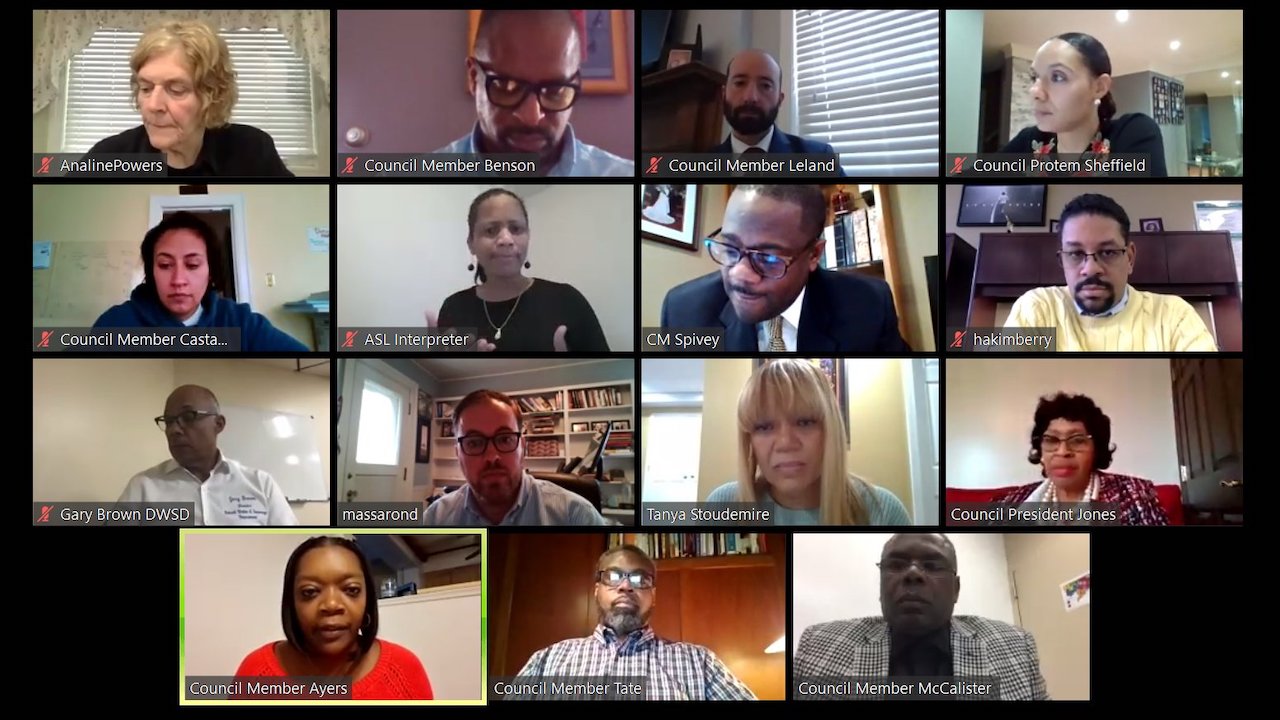Detroit Weighs the True Cost of the Coronavirus Pandemic
City financial analysts estimate a $348 million budget shortfall over the next 16 months. Some residents object to the changes meant to address that deficit.

Like many workplaces these days, Detroit City Council uses Zoom video-conference for their meetings.
COVID-19 has not only made it harder for Detroit’s government to communicate, but it created significant financial problems. City financial analysts estimate a $348 million budget shortfall over the next 16 months. While officials approved service reductions and payroll cuts to address the deficit, some residents object to how it was done.
“We have to solve for a $348 million budget shortfall now if we do not want the state back deciding our finances.” — Mayor Mike Duggan
Casino Closures Cause Cash-Flow Concerns
Before the outbreak, councilmembers were in the middle of reviewing a new budget for the city. Mayor Mike Duggan presented his original financial plan earlier in March. But that budget had to be completely re-worked as the economy ground to a halt. Companies laid-off their employees, robbing the city of income taxes, which usually account for a third of its budget funding. Duggan expects those taxes to drop by 13-percent now. The closure of the city’s three casinos created another problem.
“Next to Las Vegas, which is getting hit harder than us, we probably got hit harder than any city in the country,” Duggan told city employees in April. “Because we rely on the casino taxes.”
Duggan says gaming usually generates 17-percent of the city’s revenue, and now, that source of funding has evaporated. He says because Detroit won’t be collecting money it thought it would earn, the city has to make significant cuts over the next 16 months.
“We have to solve for a $348 million budget shortfall now if we do not want the state back deciding our finances,” says Duggan.
Avoiding a Budget Deficit At All Costs
A deficit has serious implications for Detroit. After the city exited bankruptcy in 2014, the State of Michigan took over to manage its money. While local control has been restored to city officials in the years since, the state’s Financial Review Commission can still re-establish active oversight if Detroit fails to balance its budget.
As businesses closed at the start of the outbreak, city councilmembers and financial analysts began amending the budget. The process took weeks. They needed to find new sources of funding, like federal grants through the CARES Act, or figure out how to cut expenditures. In any case, city services would be affected.
“We all believe that this is a short term in the grand scheme of things event,” says Detroit’s Chief Financial Officer Dave Massaron. “We think revenues would eventually recover as the economy speeds up.”
Massaron says Detroit will address the shortfall by withdrawing $50 million from its rainy-day fund. The city will also need to forgo making a supplemental $30 million deposit into its savings account. While Detroit is still making its obligations to the Retiree Protection Fund, an extra $20 million payment is being skipped. But tapping those reserves was not enough to close the gap. So, Massaron says Detroit needed to do more.
“A component of it comes from a reduction in personnel costs, about $50 million,” says Massaron.
The Budget’s Impact on City Services and Employees
While most city workers are unaffected by the pay cuts, many are taking 10 percent or even 80 percent hour and pay reduction. Meanwhile, those earning over $125,000 are taking a 5% pay cut.
“Highly compensated city employees should bear a bigger burden of pay cuts than lower-income workers,” says Ruth Johnson, public policy director of Community Development Advocates of Detroit.
The city is rolling back services like bus routes. Since the onset of the outbreak, buses have been free to ride and their schedule has been reduced. That’s something transit advocates are against.
“I am calling upon you all to ensure that when you vote on this budget, that you do not unfairly impact the quality of low-income workers who have already experienced economic shortfalls due to unemployment,” says Renard Monczunski, a community organizer with Detroit People’s Platform.
Detroit’s Department of Transportation is receiving $64 million from the federal CARES Act, but $20 million of that being diverted to the city’s general fund to cover lost revenue.
Other residents expressed concern over how money is being spent at the police department. Eric Blount, a minister at Sacred Heart Catholic Church, says Detroit City Council should have suspended the police’s use of facial recognition technology.
“Its practical application is extremely limited with people having to wear masks,” says Blount.
The Detroit Police Department will lose some of its resources under the budget, but its Project Green Light surveillance program will remain intact.
Detroit City Council unanimously approved the new budget. But with the uncertainty of when the COVID-19 pandemic will end, the city’s financial outlook could change again, for better or for worse.
Trusted, accurate, up-to-date
WDET is here to keep you informed on essential information, news and resources related to COVID-19.
This is a stressful, insecure time for many. So it’s more important than ever for you, our listeners and readers, who are able to donate to keep supporting WDET’s mission. Please make a gift today.

